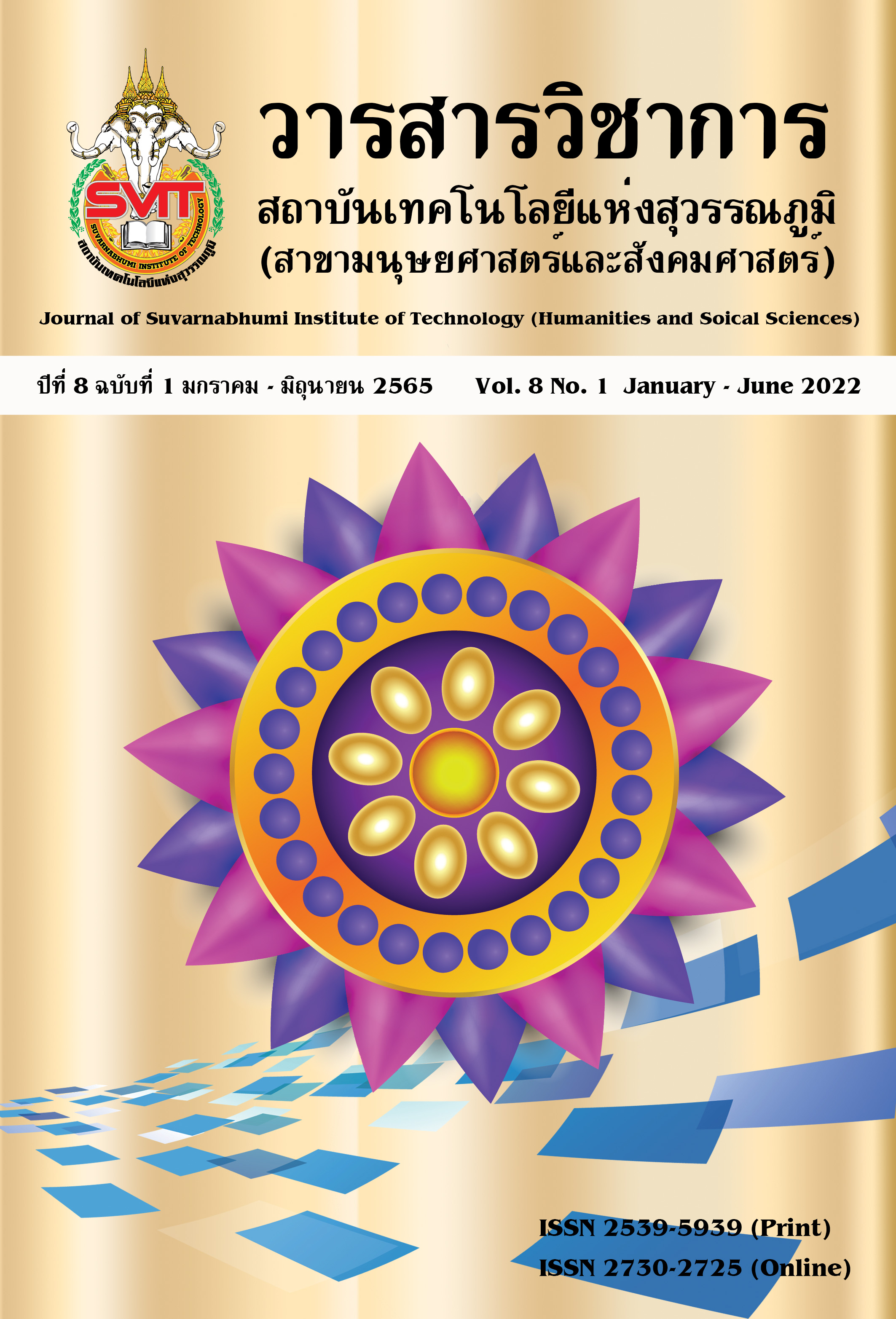COMPARISON OF ACADEMIC ACHIEVEMENT OF SS 2211402 LEARNING MANAGEMENT OF SOCIAL STUDIES AMONG THE FOURTH YEAR UNDERGRADUATE STUDENTS BETWEEN STUDENT TEAMS-ACHIEVEMENT DIVISIONS (STAD) AND CONVENTIONAL LEARNING MANAGEMENT
Keywords:
Student Teams-Achievement Divisions (STAD), Development of learning achievement, Learning Management of Social StudiesAbstract
This research aimed to compare academic achievement before and after taking SS 2211402 Learning Management of Social Studies and to compare satisfaction among the fourth-year undergraduate students in Department of Social Studies who were taught under Student Teams-Achievement Divisions (STAD) strategy and conventional learning management strategy. A sample of 50 the fourth-year undergraduate students under Department of Social Studies, Faculty of Humanities and Social Sciences, Thepsatri Rajabhat University, Lop Buri Province who took SS 2211402 Learning Management of Social Studies in the second semester of academic year 2019 was selected by using a purposive sampling technique. Research instruments included STAD-based lesson plan and conventional learning management-based lesson plan (16 sheets per plan), achievement test in a form of multiple choices and essay test, study satisfaction survey with a five-point rating scale: very high, high, moderate, low, and very low. Statistics used in analysis include average, standard deviation, and dependent and independent t-test.
Research findings were studied who were studied with the STAD strategy had higher academic achievement than those who were studied with conventional learning management strategy at the statistically significant level of .05 and Students who were studied with the STAD strategy had higher satisfaction than those who were studied with conventional learning management strategy at the statistically significant level of .05
References
กระทรวงศึกษาธิการ. (2560). คู่มือการใช้หลักสูตรสังคมศึกษา พ.ศ. 2551 ตามหลักสูตรแกนกลางการศึกษาขั้นพื้นฐาน พ.ศ. 2551. กรุงเทพฯ: โรงพิมพ์ชุมนุมสหกรณ์การเกษตรแห่งประเทศไทยจำกัด.
ทิศนา แขมมณี. (2554). ศาสตร์การสอน: องค์ความรู้เพื่อการจัดกระบวนการเรียนที่¬มีประสิทธิภาพ (พิมพ์ครั้งที่ 13). กรุงเทพฯ: จุฬาลงกรณ์มหาวิทยาลัย.
วัชรีพร สุทธิกรกมล. (2559). ผลการจัดกิจกรรมแบบกลุ่มร่วมมือด้วยเทคนิค STAD เพื่อพัฒนาการอ่านจับใจความภาษาอังกฤษเพื่อธุรกิจการท่องเที่ยวและการโรงแรม (รายงานผลการวิจัย). กรุงเทพฯ: มหาวิทยาลัยธุรกิจบัณฑิตย์.
วัลยา บุญอากาศ. (2556). ผลการจัดการเรียนรู้แบบร่วมมือเทคนิค STAD ที่มีต่อผลสัมฤทธิ์¬ทางการเรียน และทักษะการคิดวิเคราะห์วิชาคณิตศาสตร์ของนักเรียนชั้นประถมศึกษาปีที่ 6 (วิทยานิพนธ์ปริญญามหาบัณฑิต). จันทบุรี: บัณฑิตวิทยาลัย มหาวิทยาลัยราชภัฎรําไพพรรณี.
สมศักดิ์ ภู่วิภาดาวรรธน์. (2554). การยึดผู้เรียนเป็นศูนย์กลางและการประเมินตามสภาพจริง. เชียงใหม่: โรงพิมพ์แสงศิลป์.
สำนักงานคณะกรรมการพัฒนาการเศรษฐกิจและสังคมแห่งชาติ. (2560). แผนพัฒนาเศรษฐกิจและสังคมแห่งชาติ ฉบับที่สิบสอง พ.ศ. 2560 – 2564. กรุงเทพฯ: ผู้แต่ง.
สุวิทย์ มูลคํา, และอรทัย มูลคํา. (2554). การจัดกิจกรรมการเรียนรู้ที่¬เน้นการคิด. กรุงเทพฯ: อี เค บุ๊คส์.
อุษา ยิ่งนารัมย์. (2552). การเปรียบเทียบผลการเรียนรู้วิชาคณิตศาสตร์ เรื่องระบบสมการเชิงเส้นสองตัวแปร ของนักเรียนชั้นมัธยมศึกษาปีที่ 3 ที่ได้รับการสอนโดยวิธีเรียนแบบร่วมมือแบบ STAD กับการสอนแบบปกติ (วิทยานิพนธ์ปริญญามหาบัณฑิต). มหาสารคาม: บัณฑิตวิทยาลัย มหาวิทยาลัยมหาสารคาม.
Johnson, D. W., & Johnson, F. P. (2013). Joining together: Group theory and group skills (11rd ed.). Prentice-Hall, Inc.
Slavin, E Robert. (1989). STAD. Journal of Research and Development in Educational, 60(7), 42-48.
Downloads
Published
Issue
Section
License
Copyright (c) 2022 Suvarnabhumi Institute of Technology

This work is licensed under a Creative Commons Attribution-NonCommercial-NoDerivatives 4.0 International License.
The articles published are copyrighted by the Sarasas Journal of Humanities and Social Science. The opinions expressed in each article in this academic journal are those of the individual authors and do not reflect the views of Sarasas Suvarnabhumi Institute of Technology. The authors are solely responsible for all aspects of their respective articles. Any errors or inaccuracies in the articles are the sole responsibility of the authors.



